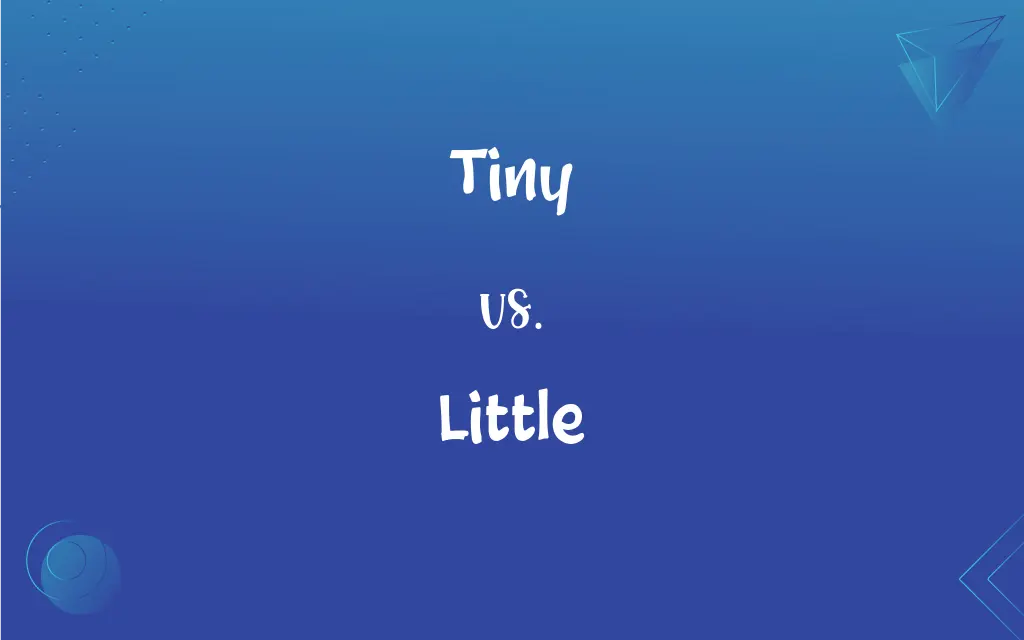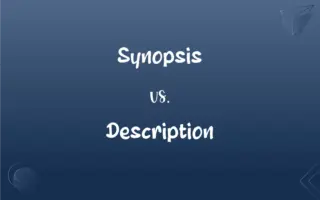Tiny vs. Little: What's the Difference?
Edited by Janet White || By Harlon Moss || Updated on November 8, 2023
"Tiny" conveys a smaller size than "little," often implying something is very small.

Key Differences
"Tiny" and "little" both describe small size, but "tiny" often suggests a more extreme degree of smallness. When someone uses "tiny," they may be emphasizing that something is remarkably small. "Little" is less intense, denoting a small size that is less surprising or less significant in its smallness.
In usage, "tiny" can express a degree of affection or endearment due to its association with delicacy. "Little" is more neutral and can be used in a broader range of contexts, often referring to size in a more general sense. However, both can convey affection depending on context.
The nuances of "tiny" and "little" extend into their connotations. "Tiny" can imply something is so small that it may be less functional or significant, whereas "little" can refer to something small but sufficient or complete in itself.
When it comes to physical objects, "tiny" might be used for things that are smaller than one would typically expect, like a "tiny screw" or a "tiny insect." "Little" might be chosen for things that are small in a more usual sense, such as a "little book" or a "little cup."
Both "tiny" and "little" serve as adjectives, but "little" can also be used as an adverb, as in "a little bit." "Tiny" does not share this flexibility and is used exclusively as an adjective to modify nouns directly.
ADVERTISEMENT
Comparison Chart
Degree of Size
Extremely small, often surprisingly so.
Small, but not necessarily to an extreme.
Connotative Use
Implies delicacy, cuteness, or insignificance.
More neutral, can imply sufficiency.
Versatility in Speech
Used only as an adjective.
Can be used as an adjective or adverb.
Emotional Context
Often used endearingly.
Less likely to be used endearingly.
Frequency of Use
Less common, more specific.
More common, broader use.
ADVERTISEMENT
Tiny and Little Definitions
Tiny
Extremely small in size.
The tiny kitten could fit in the palm of my hand.
Little
Slightly or to a small extent.
I'm a little tired after the hike.
Tiny
Minuscule in scale or scope.
He made a tiny adjustment to the machine.
Little
Young or younger.
His little brother is in first grade.
Tiny
Insignificant or trivial in amount.
There's only a tiny chance of rain today.
Little
Used to express affection or pity.
Don't cry, my little one.
Tiny
Significantly smaller than the usual size.
She wore a tiny ring on her little finger.
Little
Small in size, amount, or degree.
She took a little piece of cake.
Tiny
Reflecting something endearingly small.
They lived in a tiny cottage by the sea.
Little
Insufficient or not much.
There's little hope for recovery.
Tiny
Extremely small
The glass shattered into tiny shards that were hard to clean up.
Little
Small in size
A little dining room.
Little
Small in quantity or extent
A little money.
A little work on the side.
FAQs
Can "tiny" be used as an adverb?
No, "tiny" is only used as an adjective.
Is "little" only used for physical sizes?
No, "little" can refer to quantity or degree as well.
Is "tiny" smaller than "little"?
Yes, "tiny" generally indicates a smaller size than "little".
Can "little" be used affectionately?
Yes, "little" can be used affectionately, especially towards children.
Do "tiny" and "little" have the same synonyms?
They share some synonyms like "small," but not all, due to their connotative differences.
Is "little" ever used in formal writing?
Yes, "little" is appropriate for both formal and informal contexts.
Which is more likely to be used in scientific contexts?
"Tiny" might be preferred for precision, but "little" can also be used.
Is "tiny" a newer word than "little"?
Both words have been in use for centuries, but "little" dates back to Old English, making it older.
Can I use "tiny" to describe time?
It's less common but can be used metaphorically, as in "a tiny moment".
Can "little" be used to describe effort?
Yes, as in "He put in little effort".
Does "tiny" always mean something is too small?
Not necessarily; it can simply emphasize smallness without negative connotations.
Does "tiny" come from a different language than "little"?
"Tiny" may come from "tine," a Middle English word, whereas "little" is from Old English.
Does "tiny" carry a more negative connotation than "little"?
It can, especially if it suggests something is too small to be useful or significant.
Can "little" imply a minimal amount?
Yes, "little" often suggests a small or insufficient amount.
Are "tiny" and "little" used differently in British and American English?
Usage is generally the same, but regional preferences for one word over the other may vary.
Are there instances where "tiny" and "little" are interchangeable?
They can be, especially when the difference in degree of smallness is not crucial.
Can "little" modify non-count nouns?
Yes, but it often changes to "a little" as in "a little milk".
Can "tiny" be used for abstract concepts?
Yes, it can describe anything small in size, amount, or degree.
Can "little" be used to describe time?
Yes, as in "a little while".
Is "tiny" used in mathematics?
It can be used colloquially to describe very small quantities or measures.
About Author
Written by
Harlon MossHarlon is a seasoned quality moderator and accomplished content writer for Difference Wiki. An alumnus of the prestigious University of California, he earned his degree in Computer Science. Leveraging his academic background, Harlon brings a meticulous and informed perspective to his work, ensuring content accuracy and excellence.
Edited by
Janet WhiteJanet White has been an esteemed writer and blogger for Difference Wiki. Holding a Master's degree in Science and Medical Journalism from the prestigious Boston University, she has consistently demonstrated her expertise and passion for her field. When she's not immersed in her work, Janet relishes her time exercising, delving into a good book, and cherishing moments with friends and family.































































